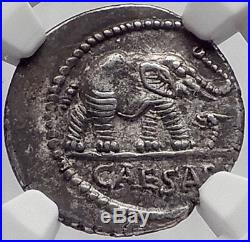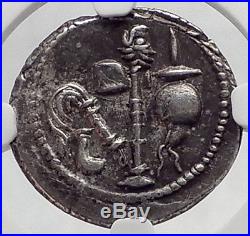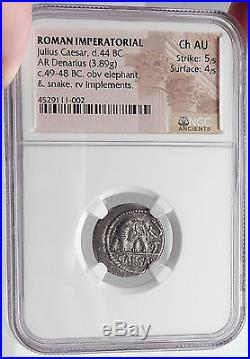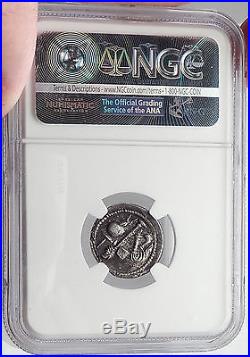




[6550] Julius Caesar – Roman General, Politician, Hero & Dictator Silver Denarius 18mm (3.89 grams) Military mint in Italy, circa 49 B. Reference: RSC 49j B. 443/1 Certification: NGC Ancients Ch AU Strike: 5/5 Surface: 4/5 4529111-002 Elephant walking right, trampling on serpent, CAESAR in exergue. Sacrificial implements, simpulum, sprinkler, axe and priest’s hat. The obverse type may symbolize victory over evil, whereas the reverse refers to Caesar’s office of Pontifex Maximus. Provided with certificate of authenticity. CERTIFIED AUTHENTIC by Sergey Nechayev, PhD – Numismatic Expert. Symbolism of the Elephant. The representation of this animal frequently occurs on Roman coins. The head, and sometimes the proboscis only, on an Elephant is a symbol of Africa. An Elephant trampling on a serpent with it’s fore feet, is the well-known type on the denarius of Julius Caesar. But it has given rise from it’s name in that region; the animal being called in the Punic language Caesar, this name became appropriated to the family. “But” says Echhel vi. 5 and 6, in noticing these conflicting opinions prior to this grandfather of Julius, we find in Livy the cognomen of Caesar. Now, if that be true, which is stated by Constantinus Manasses, that’elephants are called Caesares by the Phoenicians,’ and which, as we have just observed, is confirmed by Servius and Spartian, the present elephant would be an allusion to the name; as, moreover, it is represented as trampling on a serpent, with which reptile, according to Pliny, the elephant is at perpetual feud; and as it is established by Artemidorus, that the elephant in Italy denotes a lord, a king, or a man in high authority; we shall then recognize a type flattering to the ambition of Caesar, and by which he was desirous to intimate his victory over the barbarians, and all who were envious of his glory. Whatever may be the decision on this point, the type may be considered as a presage of future dominion. For the elephant, independently of its uses in war and amphitheatre, was an undoubted symbol of honor or of arrogance. According to Suetonius In Nerone, chap. Domitius, the ancestor of Nero, after his victory, during his consulate, over the Allobroges, was carried through the province on an elephant, preceded by a large body of troops, as in the solemnity of a triumph. Julius Caesar himself, when his military toils were over, ascended the Capitol, lighted by forty elephants, bearing torches, on either side of him. Lastly, there was no special use for elephants, except to draw the imperial thensae at funerals, or the chariots of the Caesars, either in a triumph, or in their consular processions. Elephants are represented on coins as an emblem of Eternity, it has been among the vulgar errors of the ancients to believe that those stupendous creatures lived two or even three hundred years. It was, however, on the known longevity of the elephant (exceeding, as Pliny, quoting Aristotle, says, that of all other animals), that they were employed in the funeral processions of emperors and empresses, on the occasion of their apotheosis. Gaius Julius Caesar (13 July 100 BC – 15 March 44 BC) was a Roman military and political leader. He played a critical role in the transformation of the Roman Republic into the Roman Empire. As a politician, Caesar made use of popularist tactics. During the late 60s and into the 50s BC, he formed political alliances that led to the so-called First Triumvirate, an extra-legal arrangement with Marcus Licinius Crassus and Gnaeus Pompeius Magnus (Pompey the Great) that was to dominate Roman politics for several years. Their factional attempts to amass power for themselves were opposed within the Roman Senate by the optimates, among them Marcus Porcius Cato and Marcus Calpurnius Bibulus, with the sometime support of Marcus Tullius Cicero. Caesar’s conquest of Gaul extended the Roman world to the North Sea, and in 55 BC he also conducted the first Roman invasion of Britain. These achievements granted him unmatched military power and threatened to eclipse Pompey’s, while the death of Crassus contributed to increasing political tensions between the two triumviral survivors. Political realignments in Rome finally led to a stand-off between Caesar and Pompey, the latter having taken up the cause of the Senate. With the order that sent his legions across the Rubicon, Caesar began a civil war in 49 BC from which he emerged as the unrivaled leader of the Roman world. After assuming control of government, he began extensive reforms of Roman society and government. He centralised the bureaucracy of the Republic and was eventually proclaimed “dictator in perpetuity” (dictator perpetuo). A group of senators, led by Marcus Junius Brutus, assassinated the dictator on the Ides of March (15 March) 44 BC, hoping to restore the normal running of the Republic. However, the result was another Roman civil war, which ultimately led to the establishment of a permanent autocracy by Caesar’s adopted heir, Gaius Octavianus. In 42 BC, two years after his assassination, the Senate officially sanctified Caesar as one of the Roman deities. Much of Caesar’s life is known from his own Commentaries (Commentarii) on his military campaigns, and other contemporary sources such as the letters and speeches of his political rival Cicero, the historical writings of Sallust, and the poetry of Catullus. Many more details of his life are recorded by later historians, such as Appian, Suetonius, Plutarch, Cassius Dio and Strabo. The item “JULIUS CAESAR 49BC Elephant Serpent Authentic Ancient SILVER Roman Coin NGC ChAU” is in sale since Monday, July 10, 2017. This item is in the category “Coins & Paper Money\Coins\ Ancient\Roman\ Republic (300 BC-27 BC)”. The seller is “victoram” and is located in Forest Hills, New York. This item can be shipped worldwide.
- Composition: Silver
- Culture: Roman
- Material: Silver
- Certification: NGC
- Denomination: Denarius
- Certification Number: 4529111-002
- Grade: Ch AU

